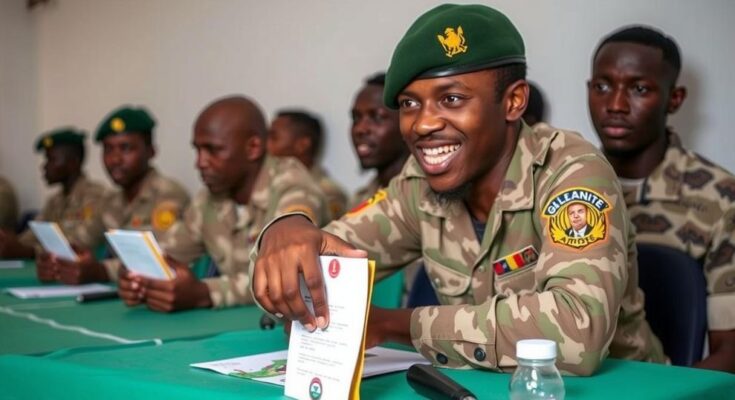Chad’s electoral commission has sought military protection for election officials amid escalating violence as elections approach on December 29. Opposition groups accuse the ruling party of manipulating the electoral process to maintain control, with significant disruptions reported during campaigning.
Chad’s electoral commission has requested military assistance to safeguard election officials and candidates prior to the upcoming elections on December 29. Heightened tensions have manifested as opposition supporters reportedly used clubs and iron bars to disrupt rallies organized by the ruling Patriotic Salvation Movement (MPS) in various towns. The National Election Management Agency (ANGE) highlighted that electoral campaigning has faced consistent challenges, including violent disruptions targeting not only candidates but officials as well. This election is significant as it signifies the conclusion of a three-year transitional phase following the demise of former President Idriss Deby Itno in April 2021.
Assane Bairra, Vice President of ANGE, indicated that if military forces do not intervene, the existing tensions could escalate into armed conflicts. Despite over 8.3 million registered voters out of Chad’s 18 million population, a coalition of 75 opposition parties and civil society organizations has labeled the elections a “masquerade,” accusing President Mahamat Idriss Deby Itno of orchestrating the electoral process to strengthen his control over the nation. Furthermore, incidents of violence were reported, where opposition supporters attacked MPS campaign caravans in various locations.
Additionally, there have been measures taken by the military to dismantle roadblocks established by opposition parties aimed at hindering MPS campaigners. Avocksouma Djona, the president of the Party of Democrats, voiced that his supporters are obstructing rallies from both the ruling party and the opposition, and he has called for a postponement of the elections. Djona criticized the governance structure, asserting that the appointments within the elections management body reflect President Deby’s influence, allowing him to control both the electoral process and final results as declared by the constitutional court.
While President Deby maintained through state television that the elections would be conducted fairly and transparently, opposition groups have swiftly dismissed these assurances. They contend that the president intends to manipulate the electoral outcomes to ensure ongoing dominance in the parliament. Deby originally assumed the role of transitional president in April 2021 following the death of his father after three decades in power, initially pledging to restore civilian governance within 18 months but subsequently extending the transition period by two years. In May, he was declared the victor of a contested presidential election boycotted by numerous opposition parties, solidifying concerns about the effectiveness of the upcoming electoral process.
Chad is currently navigating a precarious political landscape following the passing of its long-time leader, Idriss Deby Itno, in April 2021. His son, Mahamat Idriss Deby Itno, has been acting as the transitional president and has been tasked with restoring civilian rule following a promised transitional period that has faced significant delays and controversies. The country has seen a surge in political activity with multiple parties participating in the upcoming elections, yet the climate remains fraught with tension as opposition groups challenge the legitimacy of the ruling party and its control over the electoral process. The actions leading up to the December elections, including calls for military protection, reflect broader concerns about political violence and systemic issues within Chad’s governance structure.
In summary, the upcoming elections in Chad are mired in instability and accusations of unfair practices by the ruling party. The electoral commission’s appeal for military protection comes amidst violent disruptions to campaign activities, raising fears of further conflict. With millions registered to vote and a significant number of candidates contesting, the integrity of the elections remains in question, as opposition groups vehemently challenge the perceived control exerted by President Deby. This situation underscores the crucial need for transparency and fairness in the electoral process to ensure a genuine return to civilian governance in Chad.
Original Source: www.voanews.com




